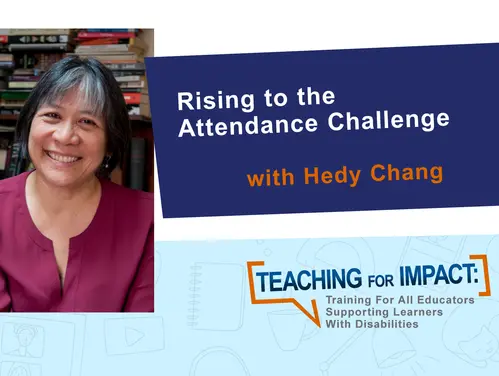What should you expect at the Teaching for Impact training June 13-14? Lots of tools to add to your best practices. Registration is under way for the training.
One of the keynote speakers is Hedy Chang, the founder and executive director of the nonprofit initiative, Attendance Works (www.attendanceworks.org) which promotes equal opportunities to learn and advances student success by reducing chronic absence.
Attendance Works successfully moved chronic absence from a little-known term to a required reporting and optional school accountability metric in the federal Every Student Succeeds Act (ESSA).
We asked Chang what we should expect from her presentation.
1. What will be the focus of your presentation?
My presentation will focus on how we can and must rise to the challenge of addressing the escalating levels of student chronic absenteeism, missing 10% of school for any reason. Doing so is essential to recovery from the pandemic and ensuring equal opportunities to thrive and learn.
2. What are some key messages you will deliver?
Chronic absenteeism is a canary in the coal mine that warns us that an individual student or groups of students are at risk of falling behind.
Monitored regularly, chronic absence data can give schools and their community partners an opportunity to resolve challenges and provide support before situations become much more difficult to turn around. Children with disabilities are especially likely to be affected by chronic absenteeism.
Chronic absenteeism can be reduced when we all work together to respond to absences with care and support and avoiding blame. Building trusting relationships that promote belonging is fundamental to improving student attendance and engagement.
In the aftermath of the pandemic, investing in the health and well-being of students, families and school staff is especially critical. When the whole community collaborates with families and schools, we can overcome systemic barriers to attendance and engagement.
3. What will training participants walk away with?
Participants will walk away with a deeper understanding of how to partner with students and families, as well as community partners, to understand attendance barriers and what motivates showing up to school, especially for students with disabilities. Participants will learn how to work as a team to establish a multi-tiered system of support that begins with prevention and early intervention.
Subscribe to receive email updates from the Iowa Department of Education.
